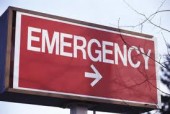Peer-to-Peer in Mental Illness: What Happens?
Last night my friend called me from the ER of our local hospital. She is where we were eight years ago: son in crisis, mother in heartbreak, son blaming the mother. Oh, yes. I remember it well.
Without dwelling on details that invade my friend's family privacy, I'll sum it up this way. Bipolar. Not taking prescribed meds. Alcohol. Threatened suicide. 911. Rehab desperately needed. Mother hoping. Son, age 26, wavering, now that rehab (which he said he needs) could now become reality.
 How I used to wish someone could support me when I was in that place, physically (ER) and emotionally (well, you know).
How I used to wish someone could support me when I was in that place, physically (ER) and emotionally (well, you know).
While we're talking, I pull over to let Ben in the car. He has just finished his NA (Narcotics Anonymous) meeting, and needs a ride home. He hears me on the phone with my friend, and figures out what's going on. My friend, who has known Ben since he was a toddler, wonders if Ben would speak to her son?
"Sure," he says.
"But Mom what do I say?"
I have no idea, really. "Say what comes to you."
So he does. What I'd love to hear, of course, is "hey, man, take your meds. They'll balance you and then you'll be able to handle the addiction part." - but I know this won't happen, since Ben still doesn't believe in the meds he's required to take. He does, however, believe in being drug-free. So he talks about that.
Whatever he says has to come from his heart, not mine.
And what he says includes this:
"Yeah, I used to hate my Mom too. But you got to figure this out yourself. It's not your Mom's fault. The difference between just drinking and having an addiction is that with addiction it's like you have this big hole you have to fill, and you're filling it with alcohol. Or a joint. Whatever. But it's not because you like the stuff, it's just you're trying to fill this big hole. And when you stop filling it, you gotta face what made that hole happen in the first place. It friggin'' hard. It sucks. " (language cleaned up by me, btw)
Wow. I could hug Ben. Later, I do. I wondered what would come out of his mouth, when asked to help someone else. Wow.
And if my friend's son stays in rehab, Ben has asked if we can visit him.
One month ago, Ben was the one in the hospital, hoping for visitors. I say a silent prayer of thanks that he has come out of this last relapse, even though we have no idea what he'll do when he returns to the "independent living" program that was such a mess in the first place. For now, he's on our couch, back to work, and starting school on Monday. How long can we keep this up, with him paying rent for an apartment he doesn't want to set foot in anymore?
No idea. But today - and yesterday? Good days. Really good days. I'll pull a Scarlett O'Hara for now and think about the rest tomorrow.
APA Reference
Kaye, R.
(2011, August 25). Peer-to-Peer in Mental Illness: What Happens?, HealthyPlace. Retrieved
on 2025, December 5 from https://www.healthyplace.com/blogs/mentalillnessinthefamily/2011/08/peer-to-peer-in-mental-illness-what-happens
Author: Randye Kaye
I have come to believe that we are all the experts on our own recovery, Indeed, the identification of common experiences is the back bone of the peer to peer movement. Nothing is as valued as the lived experience of one person to another. Over time, my trauma has given way to a strength and resilience that has not only helped others, but myself as well. Go Peers!
This is such a hopeful approach. Well-written article and full of inspiration. Thank you! We found you via connections on FaceBook.
thank you! glad you found us, and that you liked the post. Feel free to share with others .
Randye